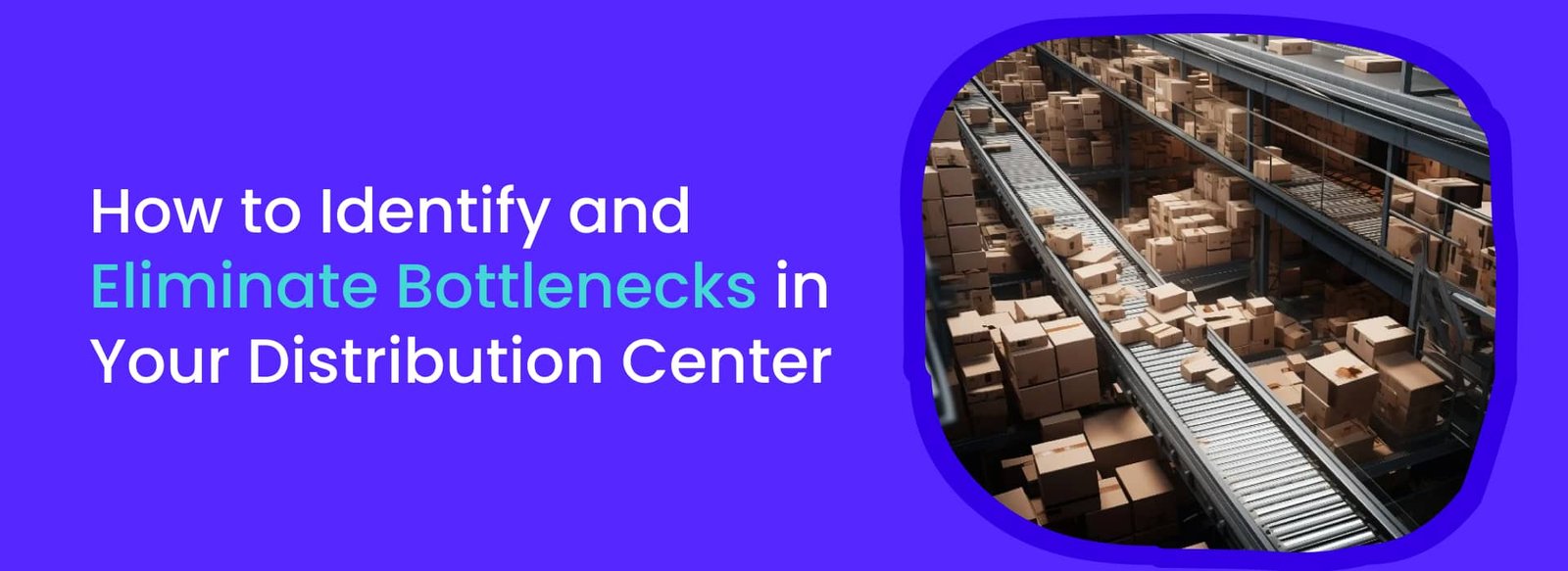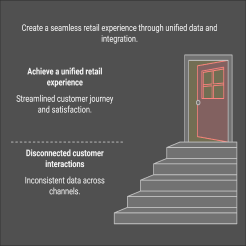
Bottlenecks in a distribution center can have a significant impact on efficiency, costs, and customer satisfaction. These operational slowdowns create delays in order fulfillment, increase operating expenses, and frustrate both employees and customers. Identifying and eliminating these bottlenecks is crucial for optimizing warehouse operations and ensuring a smooth supply chain. This guide provides practical steps to help you pinpoint and resolve bottlenecks in your distribution center.
The Cost of Bottlenecks in Your Distribution Center
Bottlenecks can be costly, leading to:
- Increased operating costs: Inefficiencies in processes can result in higher labor and storage costs.
- Slow order fulfillment: Delays in processing orders can frustrate customers and lead to lost sales.
- Reduced productivity: Employees spend more time handling repetitive tasks instead of focusing on value-added activities.
- Safety concerns: Overworked employees and cluttered workspaces can increase the risk of accidents.
According to a report by the International Warehouse Logistics Association, bottlenecks can decrease overall warehouse productivity by up to 20%.
Identifying Common Bottlenecks in Your Distribution Center
Receiving and Unloading Delays
- Inefficient Dock Scheduling and Unloading Processes: Delays in receiving and unloading can occur due to poor dock scheduling and inefficient unloading processes. Long wait times for trucks to be unloaded can create backups and slow down the entire operation.
- Outdated Equipment or Lack of Automation in Receiving Areas: Using outdated equipment or relying solely on manual processes in the receiving area can lead to inefficiencies. Automated systems can significantly speed up unloading and sorting processes.
Inefficient Warehouse Layout
- Poor Product Placement Leading to Increased Travel Time for Pickers: A poorly designed warehouse layout can increase the travel time for pickers, slowing down order fulfillment. According to the Material Handling Institute, optimizing warehouse layout can reduce travel time by up to 40%.
- Disorganized Storage Hindering Order Fulfillment Speed: Disorganized storage areas make it difficult to locate products quickly, leading to delays in order picking and packing.
Manual Picking and Packing Processes
- Reliance on Manual Labor Leading to Errors and Slow Picking Times: Manual picking and packing are time-consuming and prone to errors. Automation can improve accuracy and speed.
- Difficulty Scaling Operations During Peak Periods: Manual processes struggle to scale efficiently during peak demand periods, leading to delays and increased labor costs.
Inventory Management Issues
- Inaccurate Inventory Data Causing Stockouts or Overstocking: Inaccurate inventory data can lead to stockouts, resulting in lost sales, or overstocking, which ties up capital and increases storage costs. The Warehousing Education and Research Council reports that 69% of companies experience regular inventory inaccuracies.
- Inefficient Methods for Tracking and Managing Inventory Levels: Traditional methods of tracking inventory are often slow and error-prone. Automated inventory management systems provide real-time data and improve accuracy.
Lack of Warehouse Management Software (WMS)
- Manual Processes Hindering Data Visibility and Decision-Making: Without a modern WMS, it’s challenging to have real-time visibility into inventory levels and order statuses, hindering effective decision-making.
- Limited Capabilities for Real-Time Tracking and Order Management: A lack of real-time tracking makes it difficult to monitor order progress and manage resources efficiently.
Inefficient Labor Management
- Insufficient Staffing During Peak Times or Skill Gaps Impacting Productivity: Inefficient labor management can lead to understaffing during peak times, reducing productivity and increasing stress on workers.
- Lack of Training or Outdated Workflows Hindering Employee Performance: Employees who lack proper training or work with outdated workflows are less productive and more prone to errors.
Identifying Bottlenecks Through Data Analysis
Data analysis is crucial for identifying bottlenecks. By monitoring key performance indicators (KPIs) such as order fulfillment times, inventory accuracy, and labor productivity, you can pinpoint areas where slowdowns occur. Technologies such as IoT sensors and data analytics platforms can provide real-time insights into warehouse operations.
Strategies for Eliminating Bottlenecks in Your Distribution Center
Optimize Warehouse Layout for Efficiency
- Implement Strategic Product Placement to Minimize Picking Distances: Arrange products based on their picking frequency to minimize travel distances. Place high-demand items in easily accessible locations to speed up picking.
- Utilize Slotting Techniques to Prioritize High-Demand Items: Slotting techniques involve placing high-demand items closer to picking and packing areas to reduce the time and effort needed to fulfill orders.
Invest in Warehouse Automation Solutions
- Consider Automated Picking and Packing Systems to Improve Speed and Accuracy: Automated systems such as robotic pickers and packers can significantly increase speed and accuracy, reducing the reliance on manual labor. According to McKinsey, automation can improve picking efficiency by 50%.
- Utilize Automated Storage and Retrieval Systems (AS/RS) for Efficient Storage: AS/RS systems can optimize storage space and retrieval times, improving overall warehouse efficiency.
Implement a Modern WMS System
- Enhance Data Visibility and Streamline Inventory Management: A modern WMS provides real-time visibility into inventory levels, order statuses, and resource utilization, helping to streamline operations and improve decision-making.
- Improve Order Fulfillment Processes and Resource Utilization: A WMS can optimize order fulfillment processes and ensure that resources are used efficiently, reducing bottlenecks and improving productivity.
Improve Labor Management Practices
- Analyze Staffing Needs and Optimize Work Schedules Based on Demand: Use data analysis to predict peak periods and adjust staffing levels accordingly to ensure that you have enough workers during busy times.
- Provide Training to Improve Employee Skills and Productivity: Investing in employee training can improve skills and productivity, reducing errors and increasing efficiency.
Utilize Data-Driven Decision Making
- Leverage Warehouse Data to Identify and Address Bottlenecks Proactively: Regularly analyze warehouse data to identify bottlenecks and implement solutions before they become major issues.
- Continuously Monitor and Optimize Warehouse Operations for Efficiency: Continuous monitoring and optimization ensure that your warehouse operates at peak efficiency, reducing costs and improving performance.
Ayraxs: Your Partner in Distribution Center Optimization
Expertise in Helping Businesses Identify and Eliminate Bottlenecks: Ayraxs specializes in identifying and eliminating bottlenecks in distribution centers. Our team of experts uses advanced technologies and proven strategies to optimize your operations.
Customized Solutions for Optimizing Distribution Center Operations: We provide customized solutions tailored to your specific needs, ensuring that your distribution center operates efficiently and effectively.
Free Consultation on Distribution Center Efficiency: To help you get started, Ayraxs offers a free consultation to identify potential bottlenecks in your distribution center. Our experts will assess your current operations and recommend actionable strategies for improvement.
FAQs
What are the main benefits of eliminating bottlenecks at my distribution center?
Eliminating bottlenecks can reduce operating costs, increase productivity, improve order fulfillment times, and enhance customer satisfaction.
How Can I Measure the Impact of Bottlenecks on My Business?
Measure the impact by tracking KPIs such as order fulfillment times, inventory accuracy, and labor productivity. Compare these metrics before and after implementing improvements to assess their effectiveness.
What Is the Best Way to Get Started with Improving Distribution Center Efficiency?
Start by identifying your specific pain points and bottlenecks. Consult with experts like Ayraxs to develop a tailored plan for optimizing your operations.
How Much Does It Cost to Implement Warehouse Automation Solutions?
The cost varies depending on the complexity and scale of the automation solutions. However, the long-term benefits, such as increased productivity and reduced operating costs, often outweigh the initial investment.
What Are Some Best Practices for Warehouse Layout Optimization?
Best practices include strategic product placement, using slotting techniques, implementing efficient storage solutions, and regularly reviewing and adjusting the layout based on data analysis.





